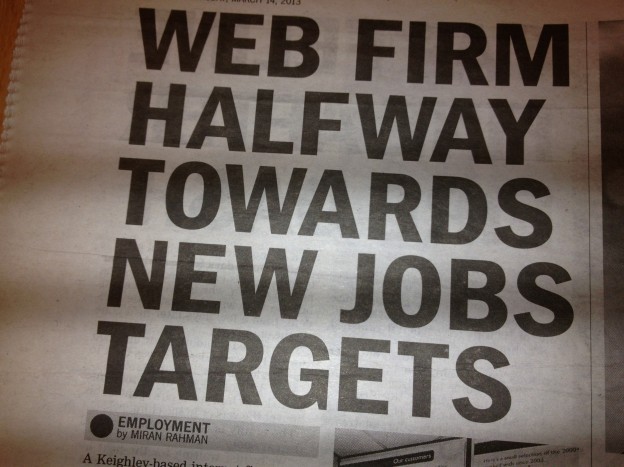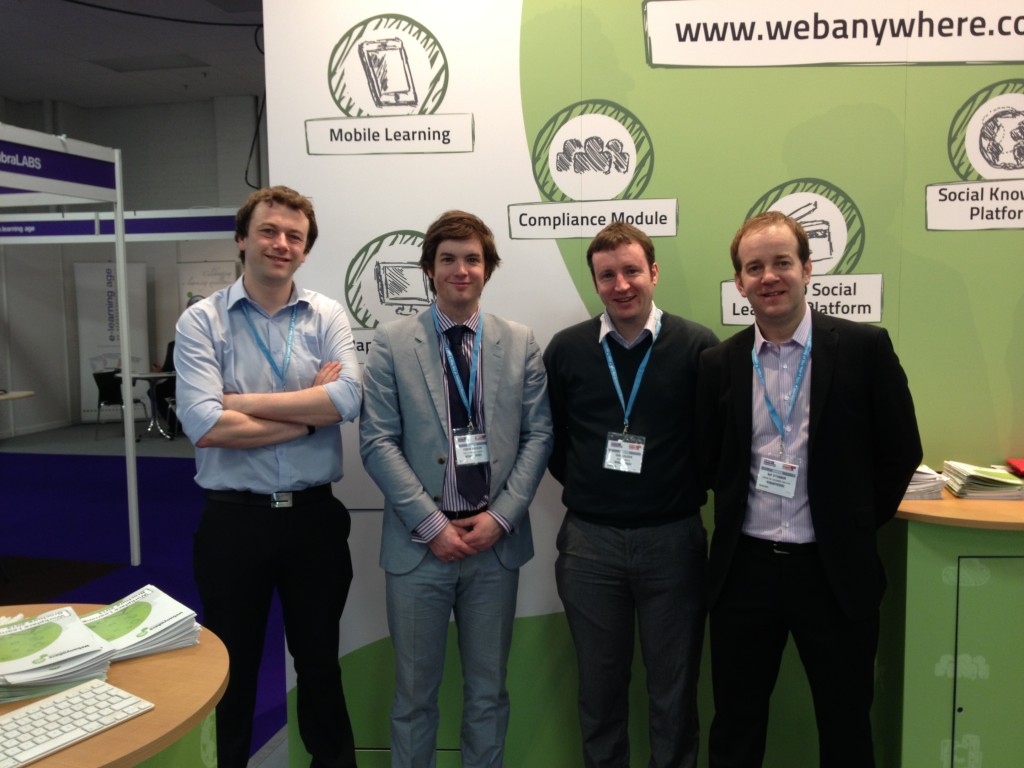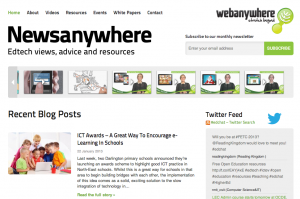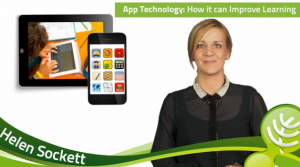
The following is an essay written about me by a student at Bradford School of Management, who was tasked with profiling a local entrepreneur as part of his Business course:-
“In order to understand why Sean Gilligan became an entrepreneur, there are 3 key elements that revolve around him. His personality or attributes, his background and experience and his skills, including how he learnt. In this essay, only his personal attributes will be discussed as these have been of great advantage to his career as an entrepreneur.
Entrepreneurship is probably best understood as a process, the constituents of which are the entrepreneur, their persistent search for opportunities, usually grounded in the market place, and their efforts to gather the resources needed to exploit those opportunities. Innovation and change, the risks people take and the roles they play to bring about change appear to be core themes in understanding the entrepreneurial process. However, you have the individual entrepreneur who is the driving force behind the process. Without that individual’s commitment, the process would not happen.
Sean Gilligan is a chemist by profession and also the owner of a software company called Webanywhere. The company started in August 2003 and presently has 3000 clients world-wide. It provides innovative website and multimedia solutions to schools and businesses with an experienced team in web design and technology related industries, including education and corporate organisations. Sean is keen to support individuals and organisations within their local markets, who share their key beliefs, and to create jobs and drive economic wealth. Sean’s entrepreneurial success can be categorised into these five psychological dimensions (Hornaday and Aboud, 1971.)
- Need for achievement
- Locus of control
- Risk-taking propensity
- Ambiguity tolerance
- Type-A personality
The need for achievement can be seen as behavior towards competition with a standard of excellence (McClelland 1953). The achievement motive is a non-conscious concern for achieving brilliance in accomplishments through an individual effort. The need to achieve can be ignited by affiliation and power. The affiliation motive could lead to the decision to create a business in order to transfer something or to offer employment security to family members or children, or legal heirs. Power is another non-conscious concern for acquiring status and having influence on others. An entrepreneur can get things done in his firm only if he can influence the people around him, so he focuses on building power through influence. Achievement motivation is a trait that is prevalent among entrepreneurs. The most consistent trait found in an entrepreneur is the sheer will to win, the need to achieve everything they do, they do not want to come in third, they do not want to come in second, they want to come first.
Locus of control, this concept was developed originally by Julian Rotter in the 1950s. Locus of control refers to an entrepreneur’s perception about the underlying main causes of events in his life. Behavior is largely guided by rewards and punishments and through contingencies such as these; entrepreneurs come to hold beliefs about what causes their actions. These beliefs in turn guide what kind attitude and behavior an entrepreneur adopts. In this case, it is right to say Sean’s behavior is guided by his personal decisions and efforts as this relates to internal locus of control. It is a characteristic of an entrepreneur that his locus of control is within him and is least affected by the changing pressures of the external environment.
Risk taking is an important distinguishing element in entrepreneurship. Risk taking is considered to be the perceived probability of receiving the rewards associated with success of a proposed situation required before embarking on a venture. Most entrepreneurs do not involve family members in their businesses because to them, it can lead to loss of control over business venture. In the aspect of Sean’s business, it is different as family members contribute to the decision making process; this is enough risk as it is. Three levels of risk taking are (low, moderate and high) could affect the decision to start a business venture. It has been shown that entrepreneurs have a propensity for moderate risk. To people, an entrepreneur takes risks; to the entrepreneur he is simply taking the next challenge after carefully evaluating the risk and deciding to do it based on his ability to accommodate it.
Tolerating ambiguity is not an excuse for lacking diligence in data gathering. Tolerance of ambiguity can be considered to mean planning and executing appropriate actions in light of limited information. The emphasis is on being able to move forward in spite of limited or conflicting information, as opposed to just neutrally recognising that such a situation exists. Ambiguity is all around us, whether it is in the form of uncertain business or economic conditions, unclear job descriptions or expectations, or vague corporate strategies. Today’s economic environment presents an extreme case of an uncertain look.
An entrepreneur’s nature an upbringing can shape his natural tolerance for ambiguity. Education and early career experiences also play major role. Even recent/present career experience (Sean is the director at British American Business Council for Yorkshire and the Humber). For example, accountants tend to have little tolerance for ambiguity as their education and experiences are based in clear rules. Marketers may have too much tolerance, and often resist moving towards metrics-driven processes. Engineers and chemists as Sean is by profession may surprisingly have the best background for developing this capability, as more complex problems require making assumptions to deal with limited information.
If ambiguity tolerance serves as a motivational channel, it may foster entrepreneurial success. It has been linked with creative behavior and to superior performance in complex tasks. Sean is someone who has a great tolerance for ambiguity because he knows that change always brings with it new opportunities. He has no fear of change because he brings to every new period of ambiguity, his past experience/present with its already highly developed coping strategies. Sean positions himself through work activities, engaged learning just in the middle of the situation and looks out for the emerging opportunity to bring a solution.
Type-A personality is seen as an action-emotion complex that can be observed in any person who is aggressively involved in a chronic, incessant struggle to achieve more and more in less and less, time, and if required to do so, against the opposing efforts of other things or other persons (Friedman and Rosenman, 1974). In other words, type-A personality characteristic have something to do with being competitive and work-obsessed. Major pattern elements include impatience and irritability, time urgency and driving ambition. Even after external pressures have decreased, the type-A personality behavior pattern remains an enduring characteristics of small business entrepreneurial CEOs (Boyd and Gumpert, 1983). The entrepreneur’s motivational profile seems to be a subset of entrepreneurs’ personality trait and leadership profile.
Sean’s characteristics are identified in his high energy, and this has made him self-confident, have high levels of self-esteem and futuristic in his outlook as he seeks to incessantly solve problems, take risks and learn from failures. He thrives on change and has a natural predisposition (hold a particular attitude) to showing initiative and willingly accepts personal responsibility for projects. All available resources are harnessed within a scope in order to achieve success on given terms.
He is drawn to the business world because of his great desire for independence, love of a competitive environment, the business world’s reward for judgment based on observable phenomena over judgment based on individual personal feelings and the fact that excelling at this core societal realm makes the greatest use of his talent. Also commitment is the founding drive of an entrepreneur. Not just the commitment to do but the commitment to do and then see it through and the commitment to never giving up on the dream. The commitment tap root for Sean Gilligan is the deep desire to live a life of significance. So, commitment for him stems from his belief that he is doing something worthwhile, not just for himself and his associates but for the greater good. It is this commitment that will see him continue in the face of disappointment and setbacks, when others see it as an all-too-hard situation.
For him, life is not a process of accumulating physical assets, neither the indulgence of physical pleasure nor even life of comfort and leisure. It is making a difference, it is living a life of significance, it is embarking on a never ending journey to be the best that he can be and being the greatest influence for good that he can. This process starts clearly with defined goals that translate into specifically defined objectives that inform the strategies and then determine the process. Another thing for sure is that he defines a focus for his venture and in spite of the many forms, changes and setbacks he manages to keep everyone focused on the main game. He knows how to focus his own life as well as the lives of others onto the targeted outcome. Sean as a successful entrepreneur is single minded with an eye-on-the-prize. He is not easily distracted; he stays focused on the task at hand until it is done.
He is today identified by his global vision. Sure, he offers solutions for his immediate surrounding market but he has an eye for how that could translate into the global sphere. Webanywhere as mentioned above is headquartered in Keighley, West Yorkshire, UK with offices in Philadelphia, USA and customers in South Africa, Australia and Europe. They serve more than 3,000 clients world-wide. He started small but his ambition is to change the world, literally.
Sean knows how to add value by making a product better and getting a target market (mainly schools) to demonstrate his appreciation of it by parting with their money. His core competency is to find new ways to solve problems and to come up with clever, workable solutions. An entrepreneur can be naturally curious, inquisitive, bright and highly flexible in his thinking. A very interesting aspect of his entrepreneurial mind-set is that having no money is not perceived by him as a barrier to making it happen. An entrepreneur thinks, plans, judges, arranges, and allocates just like everyone else but doing is the priority and often times the first thing done.
An objective approach is initiated by him who while empathising with people’s needs, is more concerned with the performance and accomplishment of a given task. He has commendable business acumen as regards the employment of family members and he seeks to lead because he is prepared to take responsibility in an effort to get the job done. He leads because others follow, and others follow because they see their needs being fulfilled in the entrepreneurial direction. He leads because in a period of great changes, he still possesses the energy to work tirelessly to solve the confronting problems.
Leadership for him is not about status but about producing results. Imbibing a healthy self-esteem, he has little or no need for status. Having a futuristic mindset and a penchant for action over words, he makes for a natural-born leader. At the very core of entrepreneurial leadership is problem solving and decision making. A problem is solved when there is one and a decision is made where/when necessary. Above all, you want to create something you are proud of. I can honestly say that I have never gone into any business purely to make money; I’ve had to create companies that I believe in 100%. These companies I feel will make a genuine difference (Richard Branson). Sean started an enterprise because he wants to make a meaning.
Starting up an enterprise with a loan from the bank, believing these steps will yield positive results is belief that forms the basis for the entrepreneurial trait never to give up. For what others see as failure, he sees as an opportunity to be better. Having said this, an entrepreneur develops series of options and looks out for significant changes in the environment or a chanced resource delivery that may ignite a promotion from option to opportunity. For an entrepreneur, timing is everything.
Sean’s experience gave him the knowledge that most successful ventures happen because they are launched at the right time. As researched, he launched his web design business about the time technology started to rule the world. The gathering of the market intelligence, positioning in the emerging field, the securing of people resource, the organising of his personal life and thinking through the business model laid the ground work prior to the successful launch.
A potential entrepreneur, as can be described in the case of Sean, is one who imagines things as they might be and has the drive to change the world around them. These are skills that are inbuilt. Just like any field of human endeavor, not everyone can do it. Entrepreneurship is one role that both create the greatest good for others while fulfilling life’s aspirations.
An entrepreneur knows he’s at the centre of every activity and so it is important to have a reputation that inspires trust and demonstrates courage, and engage in a process of appraising prospects for success. He needs to understand when to lead and when to take a step backward to let in other skill sets to manage a growing venture. Whichever way he learns, these are lessons that must be embraced to create a more successful and sustainable enterprise. Part of the success of Sean Gilligan’s entrepreneurial pursuit is energy. If one has that energy, one can create a wonderful enthusiasm.
References
Baskerville (2012) Characteristics of an Entrepreneur: the A-Z of the characteristics of an entrepreneur, http://knol.google.com/k/peter-baskerville/characteristics-of-an-entrepreneur. accessed March 2012.
Berglund, K. & Johansson, A.W. 2007, “Constructions of entrepreneurship: a discourse analysis of academic publications”, Journal of Enterprising Communities, vol. 1, no. 1, pp. 77-102.S.
Brockhaus, & Robert, H. 1980, “Risk taking propensity of entrepreneurs”, Academy of Management Journal, vol. 23, issue 3.
Greg Strosaker (2010) Developing a tolerance for ambiguity, http//www.gregstrosaker.com/ 2010/01/developing-a-tolerance-for-ambiguity.acessed March 2012.
Hill, J. & McGowan, P.1999, “Small business and enterprise development: questions about research methodology”, International Journal of Entrepreneurial Behavior & Research, vol.5, no. 1, pp. 5-5+.
Jeanne Holden (2007) Principles of entrepreneurship, http://www.america.gov/publications /books/principles-of-entrepreneurship.html.accessed March 2012.
Rotter, J. 1966, “Generalized expectancies for internal versus external control of reinforcements”, Psychological Monographs, 80 whole no. 609.









